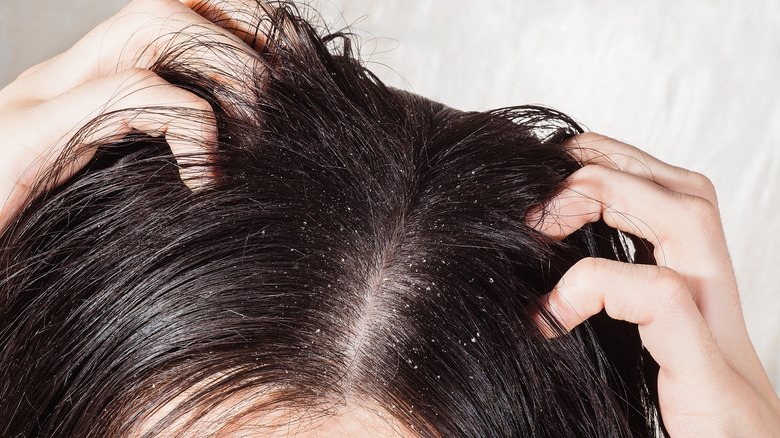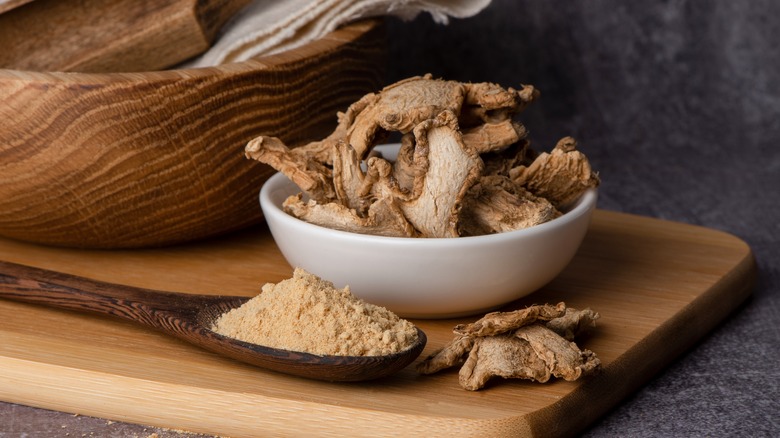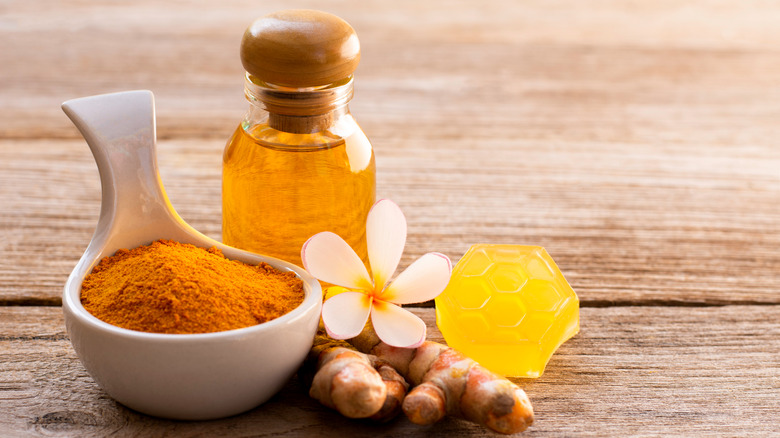Can Ginger Help In Reducing Dandruff? Here's What We Know
We may receive a commission on purchases made from links.
Dandruff may seem like a harmless scalp condition, but it can quickly turn into a source of frustration and stress. After all, there's nothing fun about walking around with a bunch of white flakes on your hair and shoulders. Things are even worse for people with dark hair and those wearing black or dark-colored clothes.
Until recently, researchers believed dandruff was due to an overgrowth of Malassezia, a fungal species. This theory still holds true, but scientists say bacteria plays a role as well. "We discovered that one species in particular, Staphylococcus capitis, was 100 times more abundant on dandruff-affected scalps," explains Sally Grimshaw, a researcher at Unilever. "Neither bacteria nor fungi are solely responsible. We believe both are involved," she added.
The trick to treating dandruff is to use special shampoos and scalp treatments, but this approach doesn't work for everyone. "You can't truly fix a problem until you know its cause," said Dr. Barry Murphy, another scientist at Unilever. One solution is to try ginger or other natural remedies with antibacterial and antifungal effects. The results might surprise you — here's everything we know about using ginger to treat dandruff.
Ginger could address the root cause of dandruff, but the research is scarce
Ginger, or Zingiber officinale, has been used as food and medicine for over 2,500 years. As the University of Rochester Medical Center explains, what makes it stand out is its content of gingerols, a class of compounds with antiemetic properties. These chemicals may help relieve nausea, fight inflammation, and boost digestive health, among other benefits. There are plenty of reasons you should be eating ginger, but the plant can also be used topically for skin and hair conditions.
The active compounds in this root exhibit antioxidant, antimicrobial, and antifungal properties. For example, some studies found that ginger may inhibit Salmonella, E. coli, M. tuberculosis, and other disease-causing bacteria, including those affecting the teeth and gums. Moreover, it appears to be effective against Candida albicans, the fungus responsible for yeast infections, reports a 2014 review published in the International Journal of Physiology, Pathophysiology, and Pharmacology.
As discussed earlier, dandruff is due to an overgrowth of bacteria and fungi. Gingerol and other active constituents of ginger can inhibit these pathogens, but, as of today, there are no studies to confirm their efficacy against dandruff. However, some experts say it could work. "Its antiseptic nature helps keep levels of natural yeast and bacteria, which trigger dandruff, low," dermatologist Audrey Kunin told Byrdie. Another theory is that ginger can clear excess sebum and thereby reduce fungal overgrowth.
How to use ginger as a dandruff remedy
Ginger root can be used as is or in combination with other ingredients. For example, you could mix grated ginger, coconut oil, and baking soda and then apply it to the scalp. Massage it all over your head, leave it on for up to half an hour, and then rinse with warm water. This DIY treatment helps reduce dirt and oil buildup on the scalp, which may help with dandruff.
Another option is to dilute ginger essential oil with a carrier oil. Apply it to your scalp, leave it for at least 20 minutes, wash with shampoo, and rinse well. Alternatively, use homemade ginger juice or a combination of ginger and fresh lemon juice, honey, or aloe vera. Take some time to look up the best and worst natural remedies for dandruff before trying out new ingredients.
If you're short on time, consider using this anti-dandruff shampoo from The Body Shop. In addition to ginger, it contains honey, willow bark, piroctone olamine, and other ingredients with antibacterial, antifungal, and anti-inflammatory properties. Some manufacturers also sell organic ginger shampoos and conditioners, which contain a mix of essential oils and herbal extracts. If all else fails, consult a dermatologist and have some tests done to see what you're dealing with.


